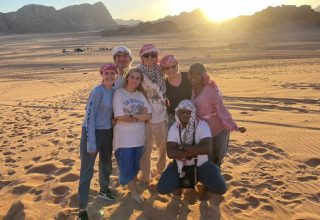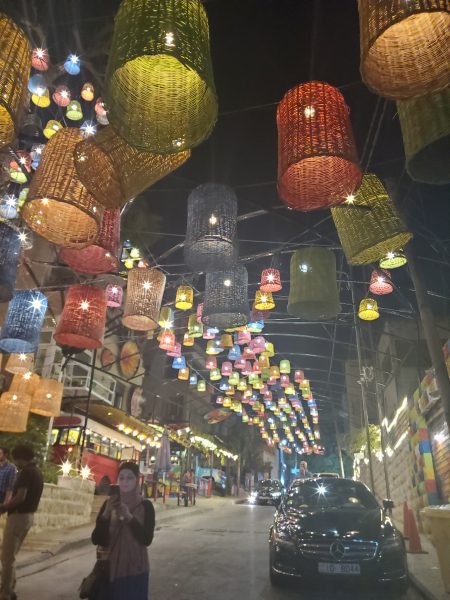In the fall of 2020, Iowa State’s Department of World Languages and Cultures welcomed its first students to its new Middle Eastern studies minor. The program offers students an interdisciplinary and in-depth understanding of the culture, history, and politics of the Middle East, including the Arab World, North Africa, Turkey, and Iran. It also equips students with skills they can apply to future career and educational opportunities in diplomacy, law, translation, and global affairs.
Now with the minor established, Nell Gabiam, associate professor of anthropology and political science and the program’s director, is beginning to see more students do exactly that and take their learning beyond the classroom.
“The program has encouraged students to go after other opportunities to expand their horizons and deepen their knowledge about the Middle East, beyond the courses that we offer,” she said.
Studying Arabic opens doors around the world
When Stephanie Warnstadt (’23 history, international studies) started college, her initial career goal was to work for the United States government. She decided to study Arabic, which is among the world’s most widely spoken languages and one of the six official languages of the United Nations.
“I thought having a minor in Middle Eastern studies would help me gain the necessary skills and knowledge to work successfully in the Middle East region,” she said.

While Warnstadt’s career goals have since shifted, her passion for Middle Eastern studies has grown. She has been accepted to Florida International University College of Law and plans to become an immigration lawyer. Her knowledge of Arabic and her cultural awareness will help her speak and interact with future clients in the Middle East, she said.
Warnstadt began learning Arabic during her first semester at Iowa State. She said Assistant Teaching Professor Ghwina Alameen, who teaches all levels of undergraduate Arabic classes, made her studies an enjoyable challenge.
“I really appreciated Professor Alameen during this experience because she was patient and understanding about the difficulty of the language,” she said. “This process has been really fun because the Arabic language is extremely rich, which means there is always an opportunity to expand your vocabulary.”
Outside of language learning, Warnstadt said her favorite Middle Eastern studies course was Arab culture, with its exploration of gestures, clothing, history, and food. The class even held a pretend Arab wedding to further their understanding of customs and traditions. In the fall of 2022, Warnstadt studied abroad in Amman, Jordan, living with a host family and furthering her language skills.

“There, I used my Arabic skills to test into the Intensive Arabic Language program,” she said. “This program helped me drastically improve my Arabic skills. I also used my knowledge of history and culture learned from the Middle Eastern studies program to communicate with and understand my professors, host mother, and Jordanian friends.”
Sophia Hartog (‘24 psychology) believes her experiences and coursework in the Middle Eastern studies program also helped her gain entrance to a competitive language program.
Hartog is a cadet in Iowa State’s Air Force ROTC program and is one of six students selected nationwide to participate in an intensive Arabic language program at San Diego State University this summer. The program is hosted by Project Go, an initiative of the Defense Language and National Security Education Office within the U.S. Department of Defense.
“I wrote about having a Middle Eastern studies minor in my application essays, and how I enjoy learning about culture from an academic perspective,” she said. “The courses I have taken so far in Iowa State’s program have really shown the complexity of the Middle East I had been unaware of before, and lecturers present engaging, relevant content.”
Community and understanding
Gabiam said she also hopes the program will help foster community at Iowa State for those interested in research and issues related to the Middle East. The minor’s interdisciplinary focus brings together expertise from across campus in history, philosophy and religious studies, political science, language, and culture.
“Beyond offering a minor, we wanted to create a space at Iowa State where faculty and students could come together, share interests, resources, and knowledge in relation to the Middle East, and to do so in a way that emphasizes the region’s diverse social, cultural, and political landscape,” she said.
For students like Warnstadt, that space has already made a lasting impact.
“The Middle Eastern studies minor has excellent faculty who are very helpful,” Warnstadt said. “The classes you take and the things you learn will change your perspective, help you think in different ways, and help you understand a different culture.”